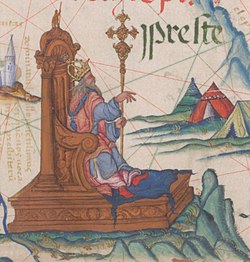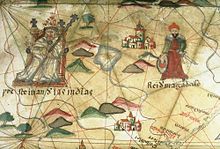Prester john
Prester John (Latin: Presbyter Ioannes) was the name of a supposed Christian ruler of the Far East according to European accounts of the Middle Ages. He was a legendary Christian patriarch, presbyter, and king. Popular accounts in Europe between the 12th and 17th centuries told of a Nestorian patriarch and king who was said to rule a Christian nation lost among pagans and Muslims in the East. The tales were often embellished with various tropes from medieval folk fantasy, depicting Prester John as a descendant of the Three Wise Men, ruling a kingdom filled with wealth, wonder, and strange creatures.
Initially, Prester John was imagined to reside in India. Stories about the evangelizing success of the Nestorian Christians in that country and the subcontinental journeys of the Apostle Thomas, documented in works such as the Acts of Thomas, were probably the first seeds of the legend. Following the arrival of the Mongols in the Western world, accounts placed the king in Central Asia, and eventually Portuguese explorers came to believe that the term referred to Ethiopia, which had by then been an isolated Christian "exclave" far removed from any another territory ruled by Christians.
Description
He was, at the same time, ruler and priest, even patriarch according to some sources, hence his title of "preste" (short for presbyter), of a Christian nation isolated between Muslims and pagans somewhere in the East. According to medieval accounts, he descended from the three Wise Men, and was both a generous ruler and a virtuous man, who ruled a territory full of wealth and strange treasures, where the patriarchate of Saint Thomas was located. His kingdom contained wonders, like a mirror through which he could see all his provinces, from whose original fable he derived the "mirror literature" of the Late Middle Ages and the Renaissance. In it, the kingdoms of each prince were registered and his duties were established.
History
The first time this character is mentioned is in the chronicle of the German bishop Otto of Freising. Initially, it was believed that the kingdom of Prester John was in India. It was then widely believed that the Nestorian Christians had succeeded in evangelizing those lands, and were ruled by a priest-king named John. Probably, the travels of Thomas the Apostle, documented in works such as the Acts of Thomas, served as the seed for the legend. After the arrival of the Mongols in the western world, the king was located in Central Asia. Finally, Portuguese explorers were convinced that they had found it in Ethiopia. The Emperor of Byzantium and the Pope had received several messages from this mysterious figure, in which he himself described the greatness and wealth of his fiefs.
The kingdom of Prester John was the subject of a search that fired the imagination of generations of adventurers, but remained out of reach. It represented a symbol of the universality of the Church for European Christians, transcending culture and geography to encompass all of humanity, at a time when ethnic and interreligious tension made that vision highly unlikely. According to certain Christian traditions, the Three Wise Men, who appear in the Gospel as "wizards from the East", came from the same kingdom as Prester John and the Holy Grail was found in this remote Asian country.
In 1218, Genghis Khan defeats Kuchlug, a Nestorian Christian khan (jan) from the Naiman tribe of western Mongolia, who ruled the Khanate of Kara-Kitai. However, as the Italian traveler Giovanni da Pian del Carpine observed, as early as the 13th century there was hardly any tolerance for Christians, and the Nestorians were already in decline precisely because of the rise of Genghis Khan, who had to contend with rivals who they practiced a syncresis of Nestorian Christianity and shamanism.
The legend of Prester John influenced the exploration voyages of the Late Middle Ages. When in the fifteenth century the Portuguese came into contact with the Christian kingdom of Ethiopia, in Africa, they thought they had found this kingdom, considering the negus or negus negusti (king of kings) Ethiopian like the mythical Prester John. Other legends identify Prester John with John the Apostle, since, based on chapter 21 of the Gospel of John, they assume that John the Apostle never died and that he was still alive in the Middle Ages. Prester John could have been one of the monarchs of Christian Ethiopia.
Contenido relacionado
Lucifer
Vulcan (mythology)
Apollo
Astaroth
Aphrodite

